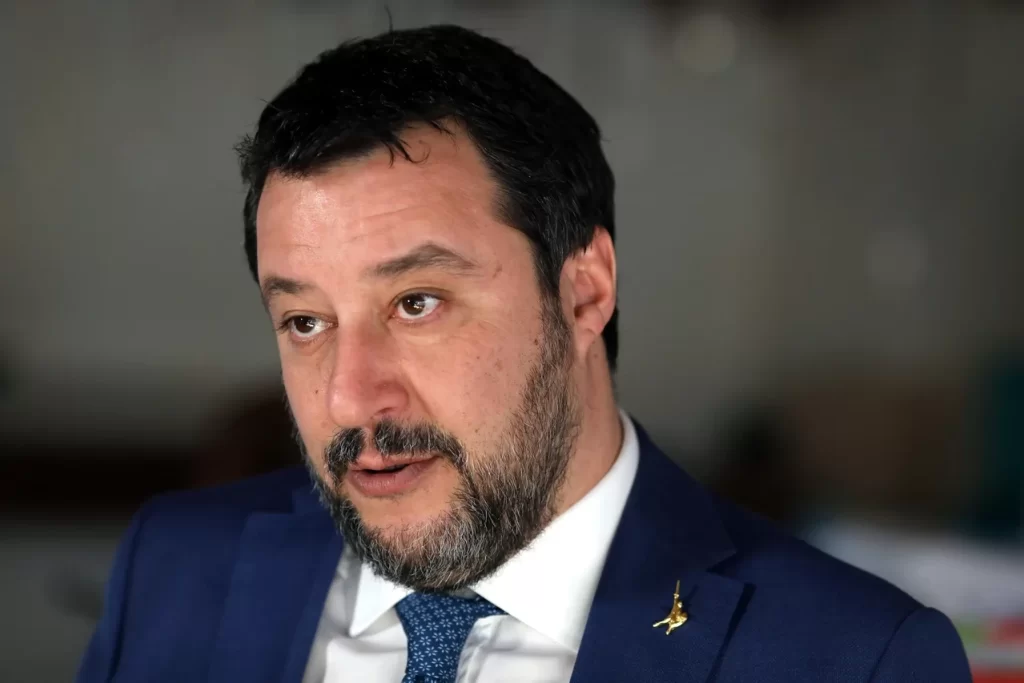Italian Deputy PM Faces Trial Over Migrant Boat Controversy
3 min read

Italian Deputy Prime Minister Matteo Salvini is facing a potential six-year prison sentence over his actions regarding a migrant boat in August 2019. The ship, operated by the Open Arms charity, was kept stranded at sea for nearly three weeks before being permitted to dock on the island of Lampedusa, following a court order.
Salvini, who was serving as Italy’s interior minister at the time, is charged with kidnap and dereliction of duty. He denies the allegations, asserting that his actions were motivated by a desire to prevent Italy from becoming a “refugee camp for all of Europe.” He has characterized his stance as “guilty of defending Italy and Italians.”
The Open Arms vessel, carrying 147 migrants rescued off the coast of Libya, was initially barred from docking in Lampedusa, a key entry point for migrants crossing the Mediterranean to Europe. Salvini’s “closed ports” policy aimed to deter people smugglers by denying them safe harbors in Italy.
During the trial, which commenced in October 2021, testimonies from the ship’s crew revealed severe conditions endured by the migrants during their extended time at sea. Reports included deteriorating sanitary conditions and a scabies outbreak among the passengers. Prosecutor Geri Ferrara argued in court that the protection of human rights must take precedence over state sovereignty, emphasizing the principle that “human rights must prevail in our fortunately democratic system.”
In January, Salvini testified that he did not perceive the situation on the boat as critical. He claimed his policies had successfully reduced migrant landings, deaths, and disappearances in the Mediterranean. Salvini also maintained that his actions were necessary to prevent Italy from becoming a primary destination for migrants arriving by sea.
If convicted, Salvini could face not only imprisonment but also a potential ban from holding future government positions. The trial is set to conclude with a verdict possibly next month.
In response to the prosecution’s request for a six-year sentence, Salvini expressed defiance. On X (formerly Twitter), he stated, “Defending Italy is not a crime and I will not give up, not now, not ever.” He defended his policies, citing a reduction in migrant arrivals during his tenure. Salvini argued that the Open Arms ship was only prevented from docking in Italy and not elsewhere, criticizing the notion of Italy as a “refugee camp for all of Europe.”
Prime Minister Giorgia Meloni, who leads the far-right Brothers of Italy party and is part of a coalition government with Salvini’s League party, showed solidarity with the Deputy Prime Minister. She criticized the prosecution, calling it “unbelievable” that a minister could face prison for fulfilling his duty to protect Italy’s borders. Meloni condemned the trial as a dangerous precedent, arguing that protecting national borders from illegal immigration should not be criminalized.
According to UN data, sea arrivals in Italy fell significantly to 11,471 in 2019, a drop from previous years and also below the numbers recorded in the years following. Salvini’s policies were credited by supporters for this decline, reflecting his party’s hardline stance against illegal migration.
Salvini’s League party, known for its stringent anti-migration stance, continues to be a key player in Italian politics. Salvini’s leadership role and his trial highlight ongoing tensions in Europe over migration policies and the balance between humanitarian obligations and national security.
As the trial continues, it underscores the broader debate within Europe about migration management and the responsibilities of national governments in addressing humanitarian crises while maintaining border security.